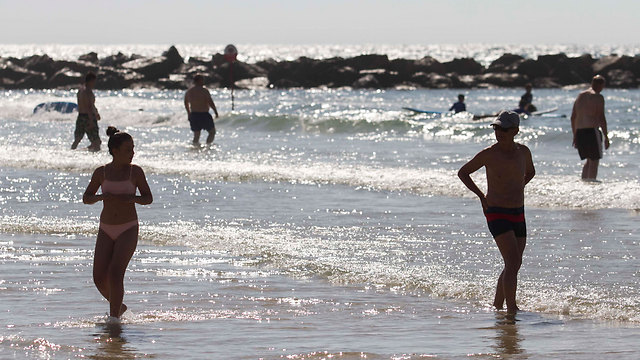
Israel's Meteorological Service has declared the month of July, which ended Monday, to be one of the hottest on record in the past 30 years—second only to July 2000.
This past July was considerably hotter than usual, three degrees over the average for the month, which is considered to be the second hottest of the year, following August. Even comparing July 2017 to August in previous years shows only August in 2010 and 2015 were hotter than this year's July.
The month was marked with extreme, prolonged heat waves throughout. While no temperature records were broken, there were long stretches of days hotter than average with only minor breaks between heat waves.
The highest temperatures were measured mostly in cities in the Shfela region, where deviations from the average reached almost four degrees.
The Meteorological Service explained that during this past July, the oceanic currents usually so synonymous with the summer months were weaker than usual.
In summer, despite the air itself being hot, north-western winds coming in from the Aegean Sea help lower temperatures. These winds were weaker than average, which means a lessened cooling effect. This was the result of several major heat waves also reaching Turkey and other Balkan countries, such as Bulgaria and Greece.
Almost every day in July was hotter than normal with few days reaching the average or lower. The Metrological Service pointed to three heat waves taking place during the month. The first heat wave, lasting July 1-4, had the highest temperature values: 40-42 degrees in the Negev, 42-43 in the valleys of the northern region, 44-46 in the Jordan Valley and the Arava (with 47.1 degrees measured in Hatzeva) and 36-38 in the mountains, the coastal region and the Shfela. While the two other heat waves were longer, they showed milder temperatures.
July temperatures were higher than average by 2-2.5 degrees during the daytime in the mountains and inland and by 1.5-2 degrees on the coast. At night, temperatures were higher than average by 1-2 degrees everywhere in Israel.
The heat hasn't let off Tuesday. Because of the Tishva B'Av fast, MDA paramedics were called to assist 168 people in need of medical attention, 96 of whom suffered from weakness, dizziness and disorientation, 66 who passed out and six who were dehydrated.

















